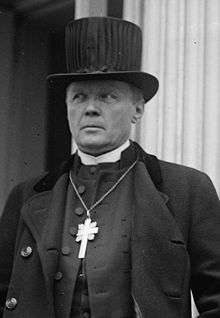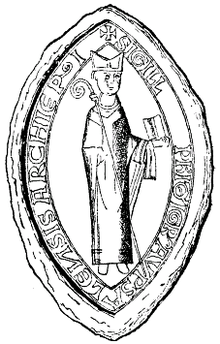Nathan Söderblom
Lars Olof Jonathan Söderblom (Swedish pronunciation: [ˈnɑ̌ːtan ˈsø̌ːdɛrblʊm]; 15 January 1866 – 12 July 1931) was a Swedish clergyman. He was the Church of Sweden Archbishop of Uppsala between 1914 and 1931,[1] and recipient of the 1930 Nobel Peace Prize. He is commemorated in the Calendar of Saints of the Lutheran Church and in the liturgical calendar of the Episcopal Church (USA) on July 12.
The Most Reverend Nathan Söderblom | |
|---|---|
| Archbishop of Uppsala Primate of Sweden | |
 | |
| Church | Church of Sweden |
| Diocese | Uppsala |
| Elected | 20 May 1914 |
| In office | 1914-1931 |
| Predecessor | Johan August Ekman |
| Successor | Erling Eidem |
| Orders | |
| Ordination | 1893 (priest) |
| Consecration | 8 November 1914 by Gottfrid Billing |
| Personal details | |
| Birth name | Lars Olof Jonathan Söderblom |
| Born | 15 January 1866 Trönö, Sweden |
| Died | 12 July 1931 (aged 65) Uppsala, Sweden |
| Nationality | Swedish |
| Denomination | Church of Sweden |
| Parents | Jonas Söderblom and Nikolina Sophie Blûme |
| Spouse | Anna Söderblom (born as Forsell) (1870-1955) |
| Children | 12 |
| Alma mater | Uppsala University |
Ordination history of Nathan Söderblom | |||||||||||||||||
|---|---|---|---|---|---|---|---|---|---|---|---|---|---|---|---|---|---|
| |||||||||||||||||
Söderblom was born in a village called Trönö, today Söderhamn Municipality, Gävleborg County. His father was a priest and a devoted Christian with a strong personal faith.
He enrolled at Uppsala University in 1883. Although not initially convinced what he wanted to study, he eventually decided to follow in his father's footsteps. On returning from a journey to the U.S., he was ordained priest in 1893.
During the years 1892 and 1893, Söderblom was first vice president and then president of the Uppsala Student Union.
In 1912, he became a professor of Religious studies at Leipzig University. But already in 1914, he was elected as Archbishop of Uppsala, the head of the Lutheran church in Sweden. During the First World War, he called on all Christian leaders to work for peace and justice.
He believed that church unity had the specific purpose of presenting the gospel to the world and that the messages of Jesus were relevant to social life. His leadership of the Christian "Life and Work" movement in the 1920s has led him to be recognised as one of the principal founders of the ecumenical movement. His was instrumental in chairing the World Conference of Life and Work in Stockholm, in 1925. He was a close friend of the English ecumenist George Bell.
He was the pastor at the church to which Alfred Nobel went and in 1930 was one of the recipients of the Nobel Prize.
After his death in Uppsala, Sweden, in 1931 his body was interred in Uppsala Cathedral.
See also
Further reading
- Dietz Lange, Nathan Söderblom und seine Zeit, Göttingen 2011
- Klas Hansson, Nathan Söderblom's ecumenical cope. A visualization of a theological and ecumenical concept. Studia Theologica - Nordic Journal of Theology, vol 66, issue 1, 2012
- Jonas Jonson, Nathan Söderblom: called to serve. Translated from Swedish by Norman A. Hjelm. Grand Rapids: Eerdmans 2016.
References
- "Religious Organizations" (in Swedish). World Statesmen. Retrieved 22 December 2014.
External links
- Nobel biography
- The Content of Christian Faith, a reflection by Nathan Söderblom
- Free scores by Nathan Söderblom in the Choral Public Domain Library (ChoralWiki)
- Newspaper clippings about Nathan Söderblom in the 20th Century Press Archives of the ZBW
| Titles in Lutheranism | ||
|---|---|---|
| Preceded by Johan August Ekman |
Archbishop of Uppsala Primate of Sweden 1914–1931 |
Succeeded by Erling Eidem |
| Cultural offices | ||
| Preceded by Waldemar Rudin |
Swedish Academy, Seat No. 16 1921–1932 |
Succeeded by Tor Andræ |
| Awards and achievements | ||
| Preceded by Frank B. Kellogg |
Laureate of the Nobel Peace Prize 1930 |
Succeeded by Nicholas Murray Butler and Jane Addams |

